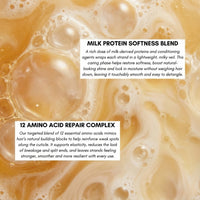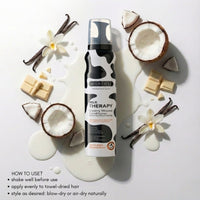Do Silicones Ruin Your Hair? The Truth Behind the Popular Ingredient
Posted by MORFOSE COSMETICS

Do Silicones Ruin Your Hair? The Truth Behind the Popular Ingredient
Silicones are a popular ingredient in hair care products due to their ability to create a smooth and shiny appearance. However, there are many myths surrounding the use of silicones in hair care and skepticism about their effects. In this article, we will explore the truth behind silicones in hair care products and their potential effects on your hair.
Understanding Silicones: What Are They and How Do They Work?
Silicones are a class of synthetic polymers that are commonly used in hair care products. They are used in a variety of products, including shampoos, conditioners, serums, and heat protectants. The primary function of silicones in hair care is to create a barrier on the hair shaft that reduces frizz and enhances shine.
The Chemistry of Silicones
Silicones are made up of silicon, oxygen, carbon, and hydrogen atoms. These molecules create a chain-like structure that gives the silicone its unique properties. The chain structure allows the silicone to form a film on the surface of the hair that repels water and reduces frizz.
It is interesting to note that silicones are not only used in hair care products, but also in many other industries. For example, they are used in the medical field to create implants and in the construction industry to seal buildings.
Different Types of Silicones Found in Hair Products
There are many different types of silicones found in hair care products. Some of the most common types include dimethicone, cyclomethicone, and phenyl trimethicone. Each type of silicone has a different molecular weight and size, which affects how it behaves on the hair shaft.
Dimethicone, for example, is a heavier silicone that is often found in hair serums. It creates a thicker barrier on the hair shaft, which can provide more protection against heat damage. Cyclomethicone, on the other hand, is a lighter silicone that is often found in leave-in conditioners. It provides a lighter barrier on the hair shaft, which can help to detangle and smooth the hair.
Phenyl trimethicone is another common type of silicone that is often found in hair styling products. It is a water-soluble silicone that can provide a light, silky feel to the hair without weighing it down. This makes it a popular choice for hair sprays and mousses.
Overall, silicones are an important part of many hair care products. They provide a range of benefits, from reducing frizz to enhancing shine, and can help to protect the hair from damage caused by heat styling.
Debunking Common Myths About Silicones
Silicones are a type of synthetic material that are commonly used in hair care products to improve the texture and appearance of hair. However, there are many myths surrounding the use of silicones in hair care. Let's take a closer look at some of these myths and separate fact from fiction.
Myth 1: Silicones Cause Hair Breakage
One of the most common myths about silicones is that they cause hair breakage. However, this is not entirely true. While some silicones can build upon the hair shaft and weigh it down over time, they do not cause breakage on their own. It is essential to ensure that you are using a reputable hair care product that contains the appropriate type of silicone for your hair type and that you are using it correctly.
In fact, some types of silicones can actually help to strengthen hair and prevent breakage. For example, dimethicone is a type of silicone that can help to improve the elasticity of hair and reduce the risk of breakage.
Myth 2: Silicones Block Moisture and Suffocate Hair
Another common myth about silicones is that they block moisture and suffocate the hair. However, this is not entirely true. Silicones can create a barrier on the hair shaft that prevents moisture from penetrating, but they do not suffocate the hair. The barrier created by silicones actually helps to keep moisture in the hair and prevent it from becoming dry and brittle.
It is important to note that not all silicones are created equal. Some types of silicones, such as cyclomethicone and dimethiconol, are lighter and less likely to cause buildup on the hair shaft. These types of silicones can help to seal in moisture without weighing down the hair.
Myth 3: Silicones Are Difficult to Remove from Hair
There is a misconception that silicones are difficult to remove from the hair, but this is not entirely true. Most silicone-based hair care products can be easily removed with a clarifying shampoo or a baking soda and apple cider vinegar rinse. However, it is important to note that if you are not using a clarifying shampoo regularly to remove buildup, silicones can accumulate on the hair shaft and wreak havoc on your hair over time.
It is also important to note that not all clarifying shampoos are created equal. Some clarifying shampoos can be harsh and strip the hair of its natural oils, leading to dryness and damage. Look for a gentle clarifying shampoo that is specifically formulated to remove buildup without damaging the hair.
In conclusion, while there are many myths surrounding the use of silicones in hair care, the truth is that they can be a beneficial ingredient when used correctly. By choosing a reputable hair care product that contains the appropriate type of silicone for your hair type and using it correctly, you can enjoy the benefits of silicones without any negative side effects.
The Benefits of Silicones in Hair Care Products
Smoothing and Frizz Control
The primary benefit of silicones in hair care products is their ability to smooth and control frizz. Silicones create a protective barrier on the hair shaft, which prevents moisture from penetrating and causing frizz. This helps to make the hair look smoother and more manageable.
Additionally, silicones can help to reduce static electricity in the hair. This is especially beneficial during the dry winter months when hair is more prone to static.
Heat Protection
Silicones can also provide heat protection when used in heat styling products, such as serums and sprays. The barrier created by silicones helps to protect the hair from the heat of styling tools, which reduces damage and breakage.
It is important to note that while silicones can provide some protection against heat damage, it is still important to use styling tools responsibly and not expose the hair to excessive heat.
Enhanced Shine and Manageability
Silicones can also enhance shine and manageability in the hair. The barrier created by silicones makes the hair shaft smoother and easier to manage, which helps to create a shinier appearance.
In addition to enhancing shine and manageability, silicones can also help to detangle the hair. This is especially beneficial for those with long or thick hair that is prone to tangling.
Conclusion
In conclusion, silicones can provide a range of benefits in hair care products. From smoothing and controlling frizz to providing heat protection and enhancing shine and manageability, silicones can help to improve the overall health and appearance of the hair. However, it is important to use hair care products containing silicones in moderation and to choose products that are appropriate for your hair type and needs.
Potential Drawbacks of Using Silicone-Based Hair Products
Silicone-based hair products have become increasingly popular in recent years due to their ability to smooth, soften, and add shine to hair. However, there are some potential drawbacks to using these products that should be considered before making them a staple in your hair care routine.
Buildup and Weighing Down Hair
One of the most common drawbacks of using silicone-based hair products is that they can accumulate on the hair shaft over time, leading to buildup. This buildup can weigh down the hair and make it look greasy and dull. In addition, it can make it more difficult for other hair care products, such as styling products and treatments, to penetrate the hair shaft and work effectively.
To avoid buildup, it is important to use clarifying shampoos regularly to remove any accumulated product from the hair. This will help to ensure that your hair stays healthy, shiny, and voluminous.
Incompatibility with Certain Hair Types
Another potential drawback of silicone-based hair products is that they may not be suitable for everyone. Some hair types, such as fine hair, may be more prone to buildup and may not respond well to silicone-based products. In addition, some people may experience irritation or allergic reactions to silicone-based ingredients.
If you are unsure whether silicone-based products are appropriate for your hair type, it is important to consult with a stylist or hair care professional. They can help you determine the best products for your hair and recommend alternative options if silicone-based products are not suitable.
Environmental Concerns
While silicone-based hair products themselves are not harmful to the environment, the production and disposal of these products can have negative effects. The manufacturing process for silicone-based products can be resource-intensive and may contribute to pollution and greenhouse gas emissions.
In addition, the disposal of silicone-based products can be problematic. These products may not biodegrade easily, which means that they can accumulate in landfills and contribute to waste. To minimize your impact on the environment, it is important to choose hair care products that are environmentally conscious and limit your use of silicone-based products when possible.
Overall, silicone-based hair products can be a great option for achieving smooth, shiny, and healthy-looking hair. However, it is important to be aware of the potential drawbacks of these products and take steps to minimize their impact on your hair and the environment.
Conclusion
Overall, silicones can be a valuable ingredient in hair care products when used correctly. They provide smoothing, frizz control, heat protection, and enhanced shine and manageability. However, it is important to be aware of the potential drawbacks of using silicone-based products, such as buildup and environmental concerns. By using silicone-based hair care products appropriately and taking steps to manage buildup and limit their impact on the environment, you can enjoy the benefits of this popular ingredient without compromising the health and appearance of your hair.



